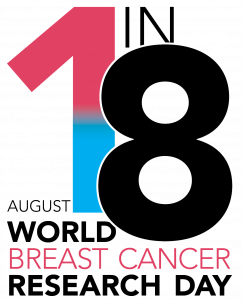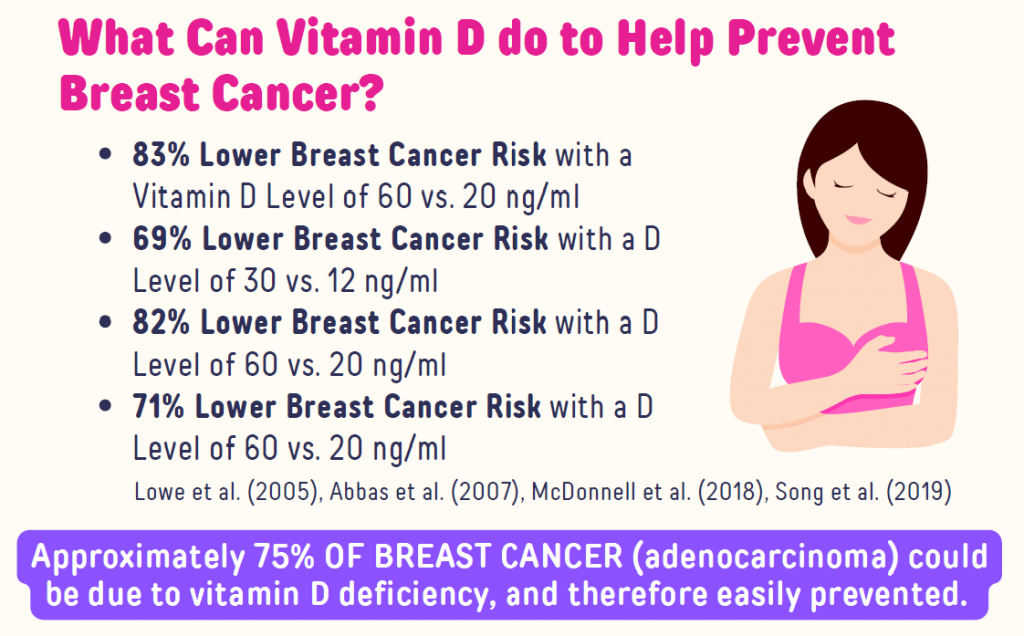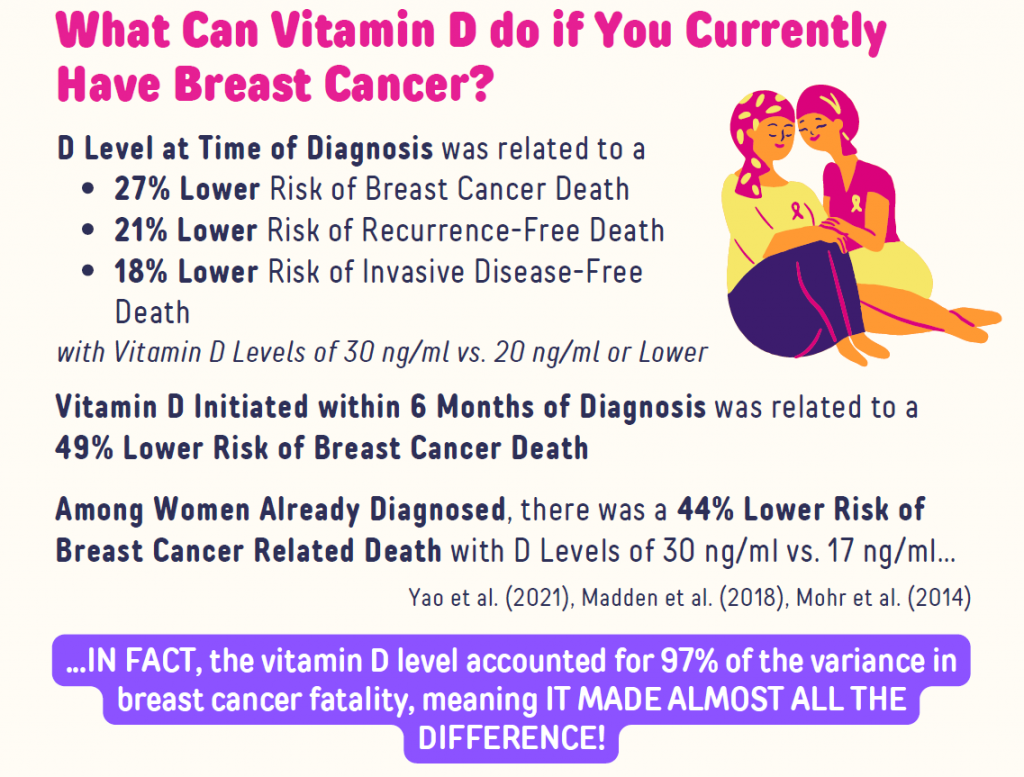Published on August 17, 2022
World Breast Cancer Research Day is August 18th – What impact can be made for breast cancer incidence and survival, for you and your loved ones?
Key Points
- Vitamin D plays an important role in breast cancer prevention; an estimated 75% of breast cancer could be due to vitamin D deficiency, and therefore easily prevented with vitamin D alone. Several studies, including those published using GrassrootsHealth cohort data, have demonstrated this relationship between vitamin D status and the risk of breast cancer.
- Research also demonstrates that it is not too late to affect outcomes with vitamin D, even after a breast cancer diagnosis… in fact, vitamin D level among breast cancer patients accounted for 97% of the variance of the relationship between vitamin D level and breast cancer fatality (meaning it made almost all the difference)!
- Other nutrients are also important for reducing risk of breast cancer and improving outcomes among women who get breast cancer, including omega-3s, magnesium, and selenium
 The statistic that 1 in 8 women will be diagnosed with breast cancer in their lifetime has remained stable, even with breast cancer awareness taking over our health care system. Today, the US Preventive Services Task Force recommends a mammogram every two years for women 50-74 years of age. This translates into 13 mammograms for every woman, most often with no symptoms, no preexisting breast cancer, no previous diagnosis of breast lesion, no known genetic mutation (such as BRCA1 or BRCA2), and no history of chest radiation at a young age.
The statistic that 1 in 8 women will be diagnosed with breast cancer in their lifetime has remained stable, even with breast cancer awareness taking over our health care system. Today, the US Preventive Services Task Force recommends a mammogram every two years for women 50-74 years of age. This translates into 13 mammograms for every woman, most often with no symptoms, no preexisting breast cancer, no previous diagnosis of breast lesion, no known genetic mutation (such as BRCA1 or BRCA2), and no history of chest radiation at a young age.
Is it working? Is this the best course of action to prevent breast cancer, and to prolong lives?
According to a study published in 2015, among 1,000 women who start screening at age 50 and are screened for 20 years, 2 to 3 will avoid dying from breast cancer and 200 women will have at least one false positive test, 30 will undergo a biopsy, 3 will be diagnosed with an interval cancer, and breast cancer will be over-diagnosed in 15. The rough estimate of the financial impact of excess testing and overtreatment following a false positive is close to 4.1 billion dollars each year.
Meanwhile, getting everyone’s vitamin D level up to at least 40-60 ng/ml, assuming an 80% reduced risk of incidence, is a safe and cost-effective intervention that could result in around 225,000 people who would be saved the trauma of breast cancer this year – both the disease itself and the horrific treatment.
THE POWER OF KNOWLEDGE – What could knowing your vitamin D level do for your breast cancer risk and survival?
There have been many studies demonstrating a lower risk of breast cancer diagnosis and death when women raise their vitamin D levels. The similar findings between all these studies emphasizes the importance of improving vitamin D status for reducing the risk of breast cancer and increasing chances of survival with diagnosis. Below are some of the key published findings on the topic of breast cancer and vitamin D for reducing the risk of breast cancer and improving breast cancer outcomes.
Vitamin D and Breast Cancer Prevention
Vitamin D plays an important role in breast cancer prevention; an estimated 75% of breast cancer (adenocarcinoma) could be due to vitamin D deficiency, and therefore, easily prevented with vitamin D alone. Several studies, including those published using GrassrootsHealth cohort data, have demonstrated the relationship between vitamin D status and the risk of breast cancer.
- Lowe et al. (2005) found an 83% Lower Breast Cancer Risk with a Vitamin D Level of 60 vs. 20 ng/ml
- Abbas et al. (2007) found a 69% Lower Breast Cancer Risk with Vitamin D Level of 30 vs. 12 ng/ml
- McDonnell et al. (2018) found an 82% Lower Breast Cancer Risk with Vitamin D Level of 60 vs. 20 ng/ml
- Song et al. (2019) found a 71% Lower Breast Cancer Risk with Vitamin D Level of 60 vs. 20 ng/ml
Vitamin D and Outcomes Among Women with Breast Cancer
Research also demonstrates that it is not too late to affect outcomes with vitamin D, even after a breast cancer diagnosis.
- Yao et al. (2021) found a 27% Lower Risk of Breast Cancer Death, a 21% Lower Risk of Recurrence-Free Death, and an 18% Lower Risk of Invasive Disease-Free Death with Vitamin D Levels of 30 ng/ml vs. 20 ng/ml or Lower at the Time of Diagnosis
- Madden et al. (2018) found a 49% Lower Risk of Breast Cancer Death with Vitamin D Supplementation Initiated within 6 Months of Diagnosis
- Mohr et al. (2014) found a 44% Lower Risk of Breast Cancer Related Death with Vitamin D Levels of 30 ng/ml vs.17 ng/ml among Breast Cancer Patients…
…in fact, the vitamin D level accounted for 97% of the variance of the relationship between vitamin D level and breast cancer fatality (meaning it made almost all the difference)!
Omega-3s, Magnesium, Selenium, and Vitamin C are Among Other Nutrients That Can Affect Breast Cancer Risk and Outcomes
Other nutrients are also important for reducing risk of breast cancer and improving outcomes among women who get breast cancer. Studies have shown
- an approximately 40% lower breast cancer risk with higher omega-3 intake (Zheng et al. 2013)
- 40% lower breast cancer risk among women with a higher magnesium intake vs a lower magnesium intake (Huang et al. 2019)
- 58% lower risk of breast cancer death with higher levels of selenium (Demircan et al. 2021)
- 15% lower breast cancer mortality with vitamin C (Harris et al. 2014)
Take Action Today and Measure Your Levels of the Above – While Contributing to Vitamin D & Breast Cancer Research!
Based on the findings presented above, measuring your levels of vitamin D, magnesium, selenium, and omega-3s may help determine if more of these nutrients might be needed to provide the greatest risk reduction for breast cancer and improve outcomes in the case of a breast cancer diagnosis.
Create your custom home blood spot kit with the following measurements to help determine if you are getting enough of the following nutrients shown to benefit your current or future breast health:
- Vitamin D
- Omega-3 Index
- Magnesium PLUS Elements
- Add hsCRP as a marker of inflammation
Having and maintaining healthy vitamin D levels and other nutrient levels can help improve your health now and for the future. Enroll and test your levels today, learn what steps to take to improve your status of vitamin D (see below) and other nutrients and blood markers, and take action! By enrolling in the GrassrootsHealth projects, you are not only contributing valuable information to everyone, you are also gaining knowledge about how you could improve your own health through measuring and tracking your nutrient status, and educating yourself on how to improve it.









